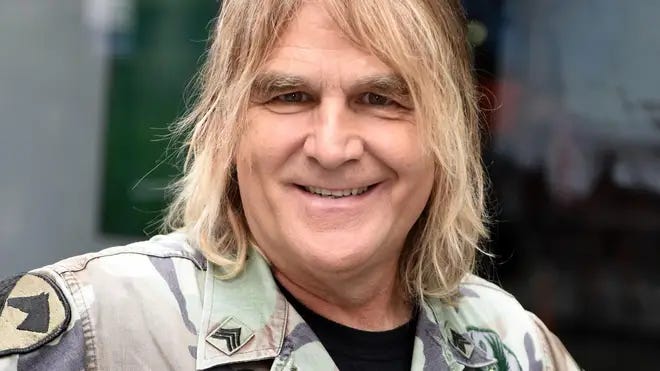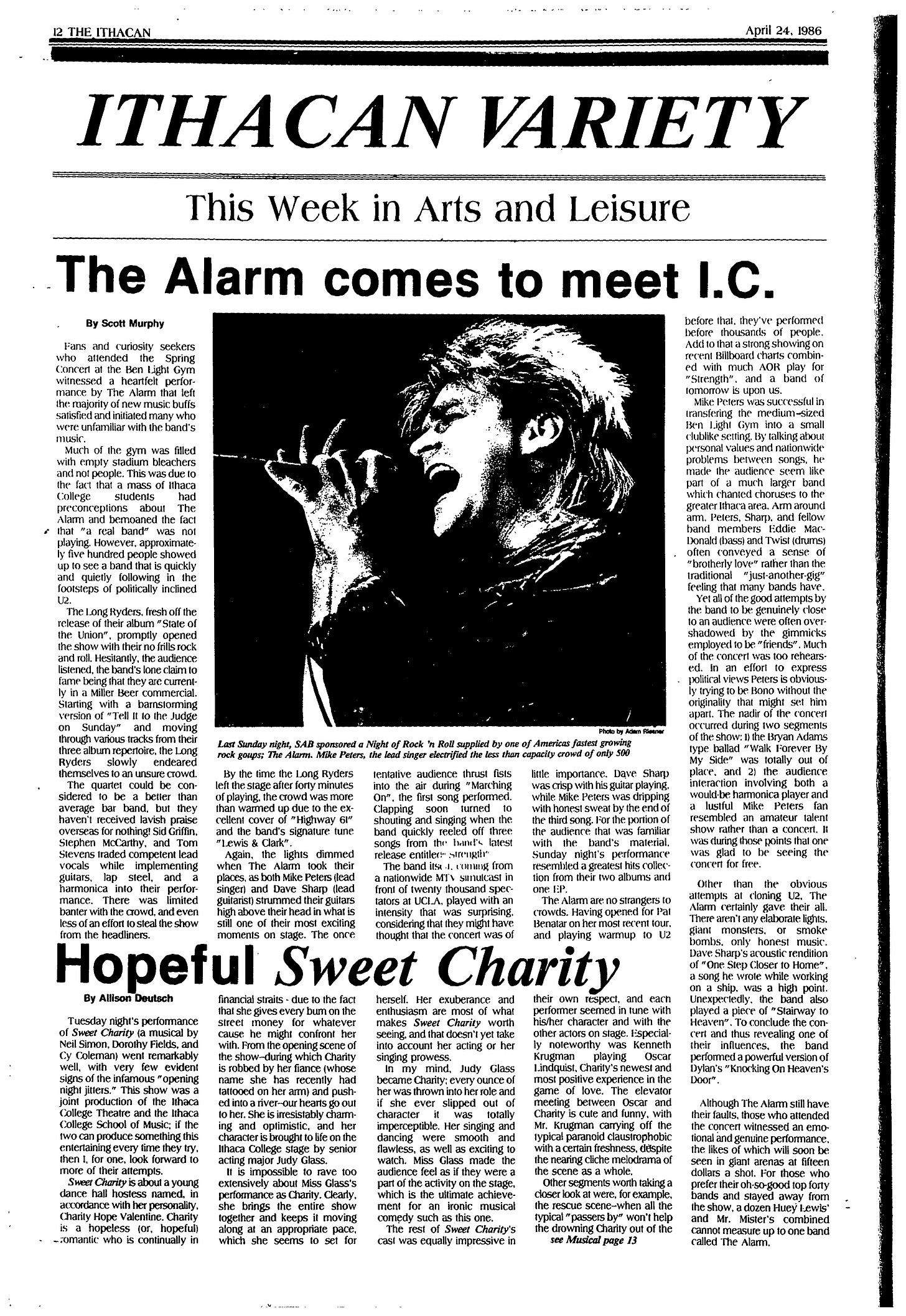HE SOUNDED THE ALARM
An appreciation of The Alarm singer Mike Peters, who succumbed to blood cancer last week at the age of 66...
On April 19th, 1984, there was plenty of joy early in the evening at the Trenton War Memorial in New Jersey. Inside the 1,800 seater, throngs of mostly young fans were thrilled at the following: that they’d found their fellow independent music-loving clan, that tickets were only US$10, and that the Welsh band The Alarm would make their area debut.
Onstage, the four members made their triumphant entrance, hair poofed to the sky, while the electric acoustic guitar attack of guitarist Dave Sharp and Mike Peters pierced right through the auditorium and into the parking lot beyond. They only played a dozen songs or so — or pretty much their entire recorded output at that point— an EP and debut album “Declaration” — but it seemed to mean everything to both the band and the crowd. They were “Marching On” against something, making a “Declaration” against something else, getting serious about “68 Guns”, and above all, making a Stand!
“Come on down and meet your maker,” Mike Peters sang. “Come on down and make a stand! Come on down, come on down, come on down and we’ll make a stand!” With the guitar crunch and clear, emphatic choruses, it was as if The Clash and U2 had spawned a musical love child, and this was a band to reckon with — if only the general public knew!
(The Alarm performing on the UK TV show “The Tube” in 1983).
With a performance so polished, sharp, and loud (I didn’t hear for three days afterward), it seemed obvious to those gathered that The Alarm was right behind The Clash in terms of passion, and could easily sit alongside U2 and Big Country in terms of a big sound (A trio that was often tied together by the press—The Alarm would even tour with U2 for a time). Add The Waterboys as a fourth act — and the Simple Minds if you wanted a fifth.
And yes, with their follow-up release “Strength”, released in 1985, the stars were aligning for them to become a big and important act. The title song (one which Peters no doubt leaned on in the years ahead) helped push the album high on the U.S. Billboard album charts for the first time, they had a Top 40 hit in the UK, and the group was even asked to open for none other than Bob Dylan on one of his tours. Sound The Alarm, they were going places.
It just so happened that one of those places was Ithaca, New York, where the group was asked to perform at a spring concert in April, 1986. On a rainy night before the show, a few guests were invited to mingle at a rooftop cafe atop a Marriot Hotel. There, Peters graciously entertained and answered all queries about his Welsh background, touring, recording, and anything else that came to mind. During a quiet interlude, I showed Peters how the hotel had a perfect vantage point of both Ithaca College on a hill to the right, and Cornell, the Ivy League university on a hill to the left. “What’s Ivy League?” Peters innocently asked.
(A review of The Alarm show at Ithaca College in 1986 by yours truly, published in The Ithacan. Retrospectively — don’t agree with all the statements contained within).
In the years that followed, the group released two studio albums that spawned their biggest hits: “Rain In The Summertime” and “Sold Me Down The River”. But as they were discovering drum machines and getting a brief taste of pop stardom, they were also alienating long-time fans who clung to their earlier alternative sounds and messages. And when the 80s turned to the 90s and musical styles were changing, the group tried to turn back the clock with one last album “Raw” (which featured a curious cover version of Neil Young’s “Rocking In The Free World”, a song that was only a year old at the time). It barely made a dent and Peters announced he was leaving the band, effectively ending The Alarm.
Peters went on plenty of other musical journeys during his career. He released several solo records, and teamed up with his wife Jules in a group called The Poets of Justice. There were various incarnations of The Alarm, often under the moniker The Alarm MM++, as well as re-recordings of the band’s earlier songs, and even a one-off show with all of the original members. For a time, Peters was even the lead singer of Big Country (following lead singer Stuart Adamson’s death). But to most industry observers, Peters’ musical impact was long over.
(A well-made short documentary that details how Big Country’s 1983 single changed Mike Peter’s life).
Retrospectively, Peters’ ultimate legacy may be his efforts to battle cancer. In 1995, he was first diagnosed with lymphoma, but recovered, only to learn that he had chronic lymphocytic leukemia in 2005. This led him to lend his name to a BBC documentary called “Mike Peters on the Road to Recovery” in 2006.
He also co-founded the Love Hope Strength Foundation (along with James Chippendale, another leukemia sufferer). In addition to raising funds globally, the foundation signed up 250,000 people to blood stem cell registries and identified nearly 5,000 of them as potential donors. They also raised money via mountain hikes and hosted the world’s highest-ever concert on Mount Everest, with the proceeds going to create better cancer facilities in predominantly third-world countries. For his endeavors, he was awarded the prestigious British MBE in 2019.
But following a series of setbacks and remissions over the last several years, Peters wasn’t able to completely rid himself of his cancer and resorted to undergoing T-Cell therapy earlier this year. He died last week at the age of 66, leaving behind his wife Jules and two sons. He also wrote two volumes of his autobiography, the second of which, titled “Hope (1991-2005)”, will be released in November.




